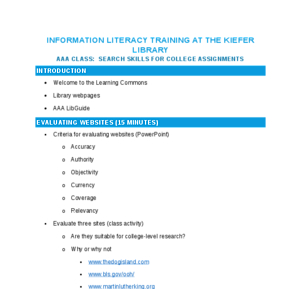7. Plan: Focusing On Your Future & Professional Career (Chapter 13)
Learning Objectives
1. Students should be introduced to the self-exploration process of career awareness.
2. Research a career option to learn how to make an informed decision about their short and long-term educational and professional goals.
Day 1: Librarian Guest Presenter "Information Literacy Training at the Kiefer Library: Search Skills for College Assignments"
Note: This class helps prepare students to conduct research for their Career Research Essay. Make sure to provide them with the assignment beforehand.
Warm-up Question:
- Ask students “How can you know if you’ll be happy and satisfied in a career?”
- From the discussion, point out that you need to understand the career as well as yourself.

Class Outline -- AAA Library Training.docx
Handouts:
Day 2: Personality/True Colors
Introduction
- Introduce VIPS (Values, Interests, Personality and Skills) and how exploring all of them will help them to understand themselves related to careers.
Personality "True Colors"
- Administer the True Colors Assessment True Colors - Test Instructions.pdf and True Colors Assessment.pdf
- Explain the Colors: Go through each color to help students understand the difference. True Colors Personality System.pptx Click here to link to a website that has examples of famous people and their colors.
- Strengths/Challenges Color Group Activity: Click here to read the instructions True Colors - Strengths and Challenges Activity.pdf
- Career Card Sorting Activity & Connectivity to Colors: Have students sort the career cards according to the four colors and have them come up with reasons.
Handouts
True Colors - Career Preferences.pdf
True Colors Handout - Color Descriptions.pdf
Showing Your True Colors Under Stress (This is optional)
True Colors Handout - Color Descriptions.pdf
Showing Your True Colors Under Stress (This is optional)
Day 3: Values, Interests & Skills
Career Awareness at Aims (25 min) Includes overview of career counseling and interviews with different individuals about their career paths.
- Note-taking Assignment: Career Awareness at Aims Video Assignment.docx
- What if you could be clear about the work that you’re here to do? What if that work was connected to your values, your talents and gifts, and your interests? The Meaningful Work Model was developed to provide a framework to develop the “work” you are here to do, the gifts that you will share with the world, and the positive contribution you will make in serving others – all of which empowers you to become a better person. The Meaningful Work activity which follows provides an opportunity to recognize the work you are here to do, at least at this point in your life.
Holland Code Interest "Party" Activity - To make more interactive, you can put signs in the classroom to represent six groups of people at a party. Read the descriptions of the type of people in each group and ask students to go to the corner of the room which they are most drawn to - e.g. the people they would most like to meet and talk with. After that, tell them to go to the second group they are most interested in, and then the third group.
Skills Mini-Lecture
- Skills are “what you do well.” There are two general types.
- Soft skills or “transferable” skills are those you’ve learned in other environments that can easily be employed in other settings (e.g. team-work, communication, attitude, reliability..) These are in greater demand than many people believe.
- Hard skills or “work content” skills are those unique to a career and what you can learn through coursework/training within a degree/certificate.
- Benefits to Developing/Knowing Your Skill Set
- The skills you develop can strongly influence your career options.
- Knowing your skills translates in greater confidence, stronger resume and cover letters and interview responses.
- Aims Community College developed a list of Institutional Learning Outcomes to outline the five skills desired for graduates:
- Critical Thinking: Students should be able to evaluate real-world examples in terms of course content and knowledge, applying thinking skills focused on critical thinking.
- Problem Solving: Students should be able to evaluate real-world examples in terms of course content and knowledge, applying thinking skills focused on problem solving.
- Professionalism: Students should strive for excellence in their performance of required roles in their future profession.
- Written Communication: Students should be able to demonstrate a high level of written communication skills as necessary for their future profession through the development and expression of ideas in writing.
- Oral Communication: Students should be able to demonstrate a high level of oral communication skills as necessary for their future profession through prepared, purposeful presentation designed to increase knowledge, to foster understanding, or to promote change in the listeners' attitudes, values, beliefs, or behaviors.
- Activity: Provide students a list of the Institutional Learning Outcomes and ask them "What “learning outcomes” are you most interested in developing while in college? Why? How might they relate to your future career?
Myers Briggs Personality Assessment (If you have time. True Colors covers personality.)
- Chapter 7 has an assessment that students can take on pg. 182. Click here for activities to do for them to understand the difference between the categories.